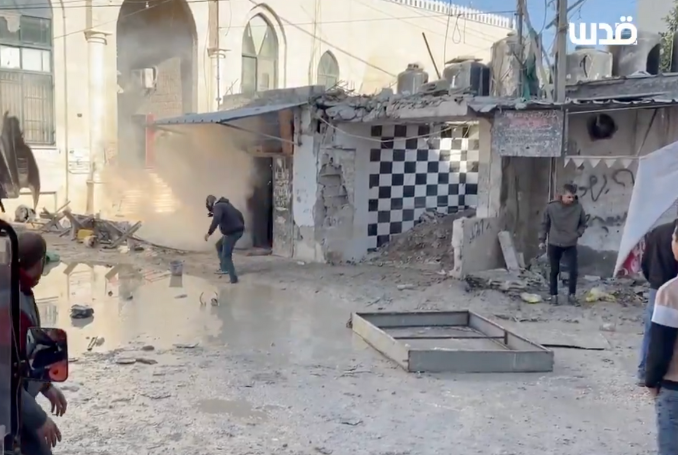
Clashes between Palestinian Authority forces and resistance fighters in Jenin intensify, exposing the PA’s role in suppressing Palestinian resistance and aligning with Israeli occupation interests.
A fragile calm has descended over Jenin refugee camp and its surrounding areas in the occupied West Bank after a night of intense clashes between resistance fighters and Palestinian Authority (PA) security forces.
For 25 days, the camp has been the site of escalating confrontations, with armed resistance groups and PA forces clashing over the PA’s ongoing crackdown on what it calls “outlaws.”
The immediate spark for the violence came after the PA arrested two young men, Ibrahim Tubasi and Imad Abu al-Hija, leading to widespread outrage among members of the Jenin Brigade. The situation quickly spiraled into open conflict.
The PA’s operations, dubbed “Protecting the Homeland,” were presented as a necessary measure to restore order and protect the people of Jenin from what they described as “security chaos.”
Brigadier General Anwar Rajab, spokesman for the PA security forces, claimed the operation aimed at targeting “outlaws,” vowing to hunt down these individuals “throughout the West Bank.”
The PA’s rhetoric, however, has been met with stiff resistance from local fighters who see this crackdown not as an effort to uphold law and order but as part of an ongoing campaign to disarm the Palestinian resistance.
The Jenin Brigade responded by stating that the PA’s true goal is to ensure a “Jenin without resistance,” emphasizing that their struggle is solely against the Israeli occupation.
Shot in the Head – Young Journalist Killed by PA Security Forces in Jenin
Rising Tensions
The conflict in Jenin is far from isolated. It reflects the broader, long-standing tensions between the Palestinian Authority and the resistance factions across the occupied West Bank.
Clashes like this have become increasingly common, particularly in northern West Bank cities like Jenin and Tulkarem, where resistance forces regularly face off against PA security personnel. These confrontations often coincide with raids and incursions by Israeli forces, settler violence, and the ongoing siege of Gaza.
The situation worsened dramatically after the killing of Rebhi al-Shalabi, a young man who died during a PA security operation. Tensions further escalated with the assassination of Yazid Ja’ayseh, a leader of the Jenin Brigade, who had been hunted by Israeli forces. Other civilians also lost their lives, and accusations of extrajudicial killings by PA security forces have become rampant.
The PA’s security apparatus has been accused not only of targeting local resistance fighters but also of arresting individuals wanted by Israel, further complicating the situation.
PA’s Ongoing Attacks on Resistance – The Palestine Chronicle Reports from Jenin
On December 28, a young Palestinian journalist, 22-year-old Shatha al-Kabbagh was shot in the head by a sniper by a sniper with the PA security forces in the Jenin refugee camp.
Human rights organizations have reported the detention of over 150 Palestinians, including resistance members, students, writers, and journalists, many of whom remain imprisoned despite court orders for their release.
Reality of PA Security Forces
Over the past decade, the PA has increasingly come under criticism for its alignment with Israel’s broader policies in the West Bank. Security coordination with the Israeli occupation, once a covert matter, has become a public feature of the PA’s relationship with the Israeli state.
One of the key justifications used by the PA for its military actions in Jenin is the need to maintain security and prevent the camp from becoming a “battleground” akin to Gaza.
This language is not new; it echoes the rhetoric of the early 2000s, when the PA, under heavy pressure from the United States and Israel, cracked down on Palestinian resistance groups, labeling them as “criminals” and “terrorists.”
This strategy was bolstered by US-funded training programs and security assistance that further cemented the PA’s role as a collaborator in suppressing Palestinian resistance.
The West Bank’s Men of the CIA – Why is the PA Killing Palestinians in Jenin?
‘Betrayal’ of Palestinian Liberation
For many Palestinians, the PA’s role in Jenin marks a final betrayal in a long history of collaboration with the Israeli occupation. In truth, the PA was never intended to be a national liberation force.
From its very inception in 1994, under the Oslo Accords, the PA was structured as a mechanism to manage the occupation rather than challenge it.
This collaboration began with the creation of the Palestinian Authority’s security forces, trained and funded by the United States and Israel, and has only grown more pronounced in the years since.
As Ramzy Baroud, a Palestinian journalist and historian, argues, the PA has become an extension of the Israeli occupation. The PA’s brutal crackdown on resistance fighters and its continued coordination with Israel serve to protect the status quo, where millions of Palestinians live under a brutal military occupation while a small elite enriches itself.
The actions of the PA, whether in Jenin or elsewhere, serve not to protect Palestinian rights but to uphold a system of control that favors Israel’s settler-colonial project, he states.
Reactions
In response to the PA’s actions, there has been widespread condemnation from Palestinian factions and human rights organizations. Groups like Hamas, the Democratic Front for the Liberation of Palestine (DFLP), and the Islamic Jihad Movement have denounced the PA’s crackdown, accusing it of aiding Israel’s plans for annexation and further dehumanization of the Palestinian people.
Human rights groups have called for an end to the PA’s security operations, demanding accountability for the extrajudicial killings carried out by PA forces.
Protests in support of the resistance in Jenin have swept across the West Bank, highlighting the growing disillusionment with the PA’s leadership and its ability to protect Palestinian interests. These protests have been accompanied by calls for greater unity among Palestinian factions to resist both the Israeli occupation and the PA’s collaboration with it.
(The Palestine Chronicle)
